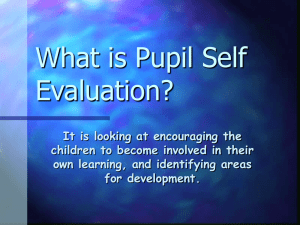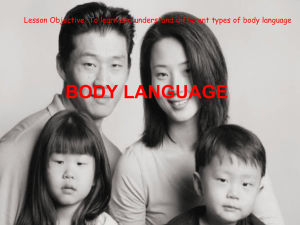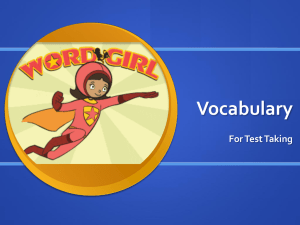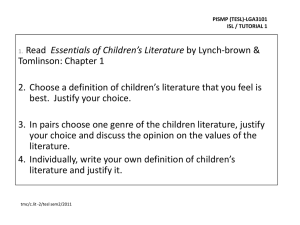Year 13 French at a Glance
advertisement
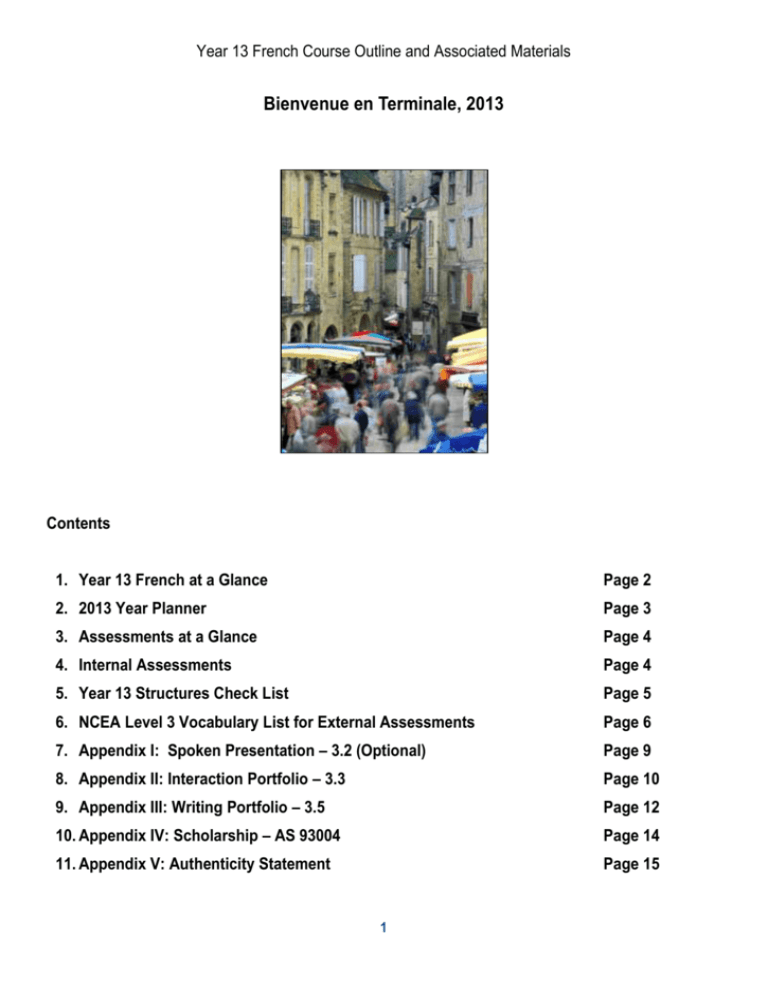
Year 13 French Course Outline and Associated Materials Bienvenue en Terminale, 2013 Contents 1. Year 13 French at a Glance Page 2 2. 2013 Year Planner Page 3 3. Assessments at a Glance Page 4 4. Internal Assessments Page 4 5. Year 13 Structures Check List Page 5 6. NCEA Level 3 Vocabulary List for External Assessments Page 6 7. Appendix I: Spoken Presentation – 3.2 (Optional) Page 9 8. Appendix II: Interaction Portfolio – 3.3 Page 10 9. Appendix III: Writing Portfolio – 3.5 Page 12 10. Appendix IV: Scholarship – AS 93004 Page 14 11. Appendix V: Authenticity Statement Page 15 1 Year 13 French Course Outline and Associated Materials Year 13 French at a Glance World Matters – Les Affaires Mondiales Achievement Objectives at Curriculum Level 8 In Year 12, you began to explore and question the views of others and were able to share and justify your own views on matters important to youth. Now you extend those skills so that you can explore, analyse, synthesise, evaluate, justify and challenge a greater variety of ideas and perspectives in different situations to your own, that is, in society at large and world-wide. This aligns with the extended abstract in Biggs and Collis’ SOLO Taxonomy. Content The Big Idea in Year 13 French is “World Matters,” the things that are essential to world health, wealth and peace. Through the topics in our text, AQA A2 French, you will listen, read and view, as well as speak, write, present and perform extended French. AQA A2 French follows logically from AQA AS French and comes with the same online resource, Kerboodle. We supplement these with Schaum’s Grammar and online resources such as Tex. We also use Language Perfect, TF1 news bulletins, Mary Glasgow magazines and some well-loved and well-known literature, such as Petit Prince and the poetry of Prévert, Verlaine and Rimbaud. Topics include: Term I: L’environnement La pollution L’énergie La protection de la planète Term II: La société multiculturelle L’immigration L’intégration Le racisme Term III: Les problèmes sociaux contemporains Richesse et pauvreté L’ordre publique Sciences et technologie Term IV: External examination strategies and practice Achievement Standards In addition to the Listening, Speaking, Reading and Writing standards that you are familiar with, this year we add an Interaction standard, which requires spontaneity and fluency. We also invite selected students to sit Scholarship. Attendance and Homework Attendance and homework are essential goals for all Year 13 students. As school leaders, many new pressures will be placed upon you and if you don’t establish and maintain good habits, you will be overwhelmed. You need to be present and you need to do your homework. If homework is not explicitly given by the teacher, then it is understood that you will give it to yourself. You know what you personally need to achieve. Remember: a little often. School policy states that you should spend approximately two hours homework per week per subject. Jobs and socialising take second place. Stationery and Fees You need a two-ring binder with refill and dividers (no exercise books please), $15.00 in total for six magazines, earphones, and a 20 page clear file to store assessments. If you have a netbook, you might explore a paperless option. Note that the school now provides your Language Perfect access. 2 Year 13 French Course Outline and Associated Materials Year Planner Term III: Term IV: EA Readiness Les problèmes sociaux contemporains Term II: La société multiculturelle Term I: L’environnement Year 13 French 2013 (Draft Nov 2012) “Les Affaires Mondiales” (World Matters) Week 1 2 3 4 5 6 7 8 9 10 11 Week 1 2 3 4 5 6 7 8 9 10 Week 1 2 3 4 5 6 7 8 9 Week 1 2 3 4 Date 4-8 Feb 11-15 18-22 25-1 Ma 4-8 11-15 18-22 25-29 1-5 Apr 8-12 15-19 Date 6-10 May 13-17 20-24 27-31 4-7 Jun (QB) 10-14 17-21 24-28 1-5 Jul 8-12 Date 29-2 Aug 5-9 12-16 19-23 26-30 2-6 Sep 9-13 16-20 23-27 Date 14-18 Oct 21-25 29-1 Nov (Labour) 4-8 Review Topic Assessment Self-Assessment NCEA Levels 1 and 2 vocabulary and structures L’environnement – la pollution, l’énergie, la protection de la planète NCEA IA: L’environnement – Interaction & Writing Le Petit Prince de Saint-Exupéry Topic Le Petit Prince (continued) La société multiculturelle – l’immigration, l’intégration, le racisme Assessment NCEA IA: Le PP Writing MY Practice Assessment – Listening, Reading NCEA IA : La société multiculturelle – Interaction & Writing La poésie NCEA IA : La poésie – Interaction Topic Les problèmes sociaux contemporains – richesse et pauvreté, l’ordre publique, sciences et technologie Assessment NCEA IA : Les problèmes sociaux contemporains – Presentation, Interaction & Writing Portfolio Conferences EY Mock Externals followed by Review and Reflection EY Practice Assessment – Listening, Reading followed by NCEA Readiness Self-Assessment Topic Assessment External Standards – Strategies and Practice NCEA Level 3 and Scholarship Practice examinations 3 Year 13 French Course Outline and Associated Materials Assessments at a Glance Level 3 NCEA Achievement Standards 3.1 5 credits External Demonstrate understanding of a variety of extended spoken French texts. 3.2 3 credits ExternalInternal 3.1 Give a clear spoken presentation in French that communicates a critical response to stimulus material. Context 3.3 6 creditsInternal Internal 3.2 Interact clearly using spoken French to explore and justify varied ideas and perspectives in different situations. 3.4 5 credits Internal External 3.3 Demonstrate understanding of a variety of extended written and/or visual French texts. 3.5 5 creditsExternal Internal3.4 Write a variety of text types in clear French to explore and justify varied ideas and perspectives. Internal Assessments As a result of winning an essay competition, you have been selected as a delegate to a United Nations Youth Congress to be held in Paris, October 2013. While you are there, you take part in various summits on topics of interest to world youth. Content Choose one of the three sub-themes from each term’s major theme and complete the writing and interaction tasks according to the grid below and according to your personal preferences: L’environnement: Le PP La société multiculturelle: La poésie Les problèmes sociaux contemporains La pollution L’immigration Richesse et pauvreté L’énergie L’intégration L’ordre public La protection de la planète Le racisme Sciences et technologie: avances ou régression? Writing Interaction Presentation Text Types Writing Portfolio Compete in an essay competition to win representation at the UN Youth Congress (outline, justify, present hypotheses, recommend) Design and develop a web page introducing an aspect of France’s literary heritage that has significance for young people world-wide (review, compose, construct, convince ) Write a letter of protest at another nation’s behaviour (use evidence, criticise, challenge) Create promotional material for fundraising to assist a developing nation (argue, justify, persuade, promote) Interaction Portfolio Take part in a panel discussion (use facts, figures and trends to support and challenge ideas and opinions) Using the stories of individuals as evidence, argue for change (recount, predict , argue and justify) Select a poem from an anthology and discuss why you chose it and how much it has challenged, influenced or persuaded you (analyse, compare, evaluate, explain, justify) Make and counter controversial statements on contentious issues (generalise, prove, debate) 4 Optional Presentation You have been selected from amongst the youth delegates to speak to the Model Youth Assembly on a social concern that you feel strongly about. Use our class resources (text, image, video, song etc) as a starting point for your presentation. (defend, use evidence, explain, justify, hypothesise, recommend) Year 13 French Course Outline and Associated Materials Year 13 Structures Check List Adjectives Irregular forms That change meaning with position Compound adjectives of colour Adverbs How to form Position of adverbs with infinitive Comparatives of adverbs Superlatives of adverbs La plupart (most) and bien (many) Articles Definite article with time expressions Definite article with prices and speed Definite article with parts of the body Definite article with titles C’est or il est? Conjunctions C’est-à-dire, d’une part…d’autre part, en revanche, par contre, tout compte fait, alors que, même si… Those followed by the subjunctive Negation Ne… aucun/aucune, ne…pas du tout, ne… ni… ni, ne… guère, ne… nulle part, Ne… plus rien, plus jamais, jamais rien, jamais personne Prepositions On level 3 vocab list Dimensions Pronouns Possessives : mine, yours, hers etc Relative pronouns with prepositions Dont, ce dont, celui/celle dont Tout ce qui, tout ce que Lequel/laquelle/lesquels/lesquelles Verbs: Present Perfect Pluperfect Imperfect Simple future Conditional Future perfect/future anterior Conditional perfect After having (après avoir/être) Present subjunctive (and irregulars, when to use it, avoiding it) Past historic Past perfect subjunctive Plaire à Causative Passive voice and how to avoid it Reflexive/reciprocal verbs Infinitive as a subject Reported/indirect speech Verb + infinitive 5 Self-Assessment Traffic Lights Year 13 French Course Outline and Associated Materials NCEA Level 3 Vocabulary List for External Examinations In addition to the vocabulary already learned at Levels 1 and 2, the following list is required learning at Level 3. However, for the purpose of external assessments, the NCEA Examiner will not be restricted by the list. You may be asked to make informed guesses about unfamiliar words using context and prior knowledge. You are expected to be able to recognise: • where a noun, adverb, or adjective can be constructed from the verb • cognates and loan words • word families • the opposite of a word, e.g. égal, inégal. 6 Year 13 French Course Outline and Associated Materials 7 Year 13 French Course Outline and Associated Materials 8 Year 13 French Course Outline and Associated Materials Appendix 1: Spoken Presentation – 3.2 (Optional) AS 91544, Version 1, 3 credits Standard Give a clear spoken presentation in French that communicates a critical response to stimulus material. Context and Task You enter an essay competition and are selected as a delegate to a United Nations Youth Congress to be held in Paris, October 2013. While you are there, you take part in various summits on topics of interest to world youth. You are further selected from amongst the youth delegates to speak to the Model Youth Assembly on a social concern that you feel strongly about. Use our class resources or any of your own resources (text, image, video, song etc) as stimulus material for your presentation. Conditions of Assessment The presentation will be about 2-3 minutes long. At all times, quality is more important than length. Digital video evidence will be collected as evidence. Communication is the focus but you may have prepared notes, cue cards, props, other supporting material, including a copy of the text but you must not read it. These aids should not detract from the presentation. The audience will be the teacher and the class. No reassessment opportunities will be offered. Achievement Criteria Achievement Achievement with Merit Achievement with Excellence Give a clear spoken presentation in French that communicates a critical response to stimulus material. Give a clear, convincing spoken presentation in French that communicates a critical response to stimulus material. Give a clear, effective spoken presentation in French that communicates a critical response to stimulus material. This involves: explaining and justifying a viewpoint in culturally appropriate spoken French. This involves: explaining and justifying a viewpoint, in French that is generally credible and connected. This involves: explaining and justifying a viewpoint, in French that is controlled and integrated. Communication is achieved overall despite inconsistencies in, for instance: language features, pronunciation, intonation, gesture, rhythm patterns, delivery speed or audibility, stress patterns, tones. A range of language and language features are selected and used that are fit for purpose and audience. A range of language and language features are capably selected and successfully used that are fit for purpose and audience. Communication is not significantly hindered by inconsistencies. Communication is not hindered by inconsistencies. Explanatory Notes Clear refers to language that gives no doubt as to intended meaning. Critical response refers to a presentation which includes analysis, interpretation, or evaluation of stimulus material. Stimulus material refers to any linguistically and culturally appropriate material used as a starting point for a spoken presentation, such as text, poster, music video, lyrics, literature, TV, film, personal experience and the observation of cultural practices. Contexts may be concrete or abstract. The stimulus material may either be chosen by the student or provided by the teacher. Authenticity See Authenticity Statement in Appendix V, p15. 9 Year 13 French Course Outline and Associated Materials Appendix 2: Interaction Portfolio – 3.3 AS 91545, Version 1, 6 credits Standard Interact clearly using spoken French to explore and justify varied ideas and perspectives in different situations. Context As a result of taking part in an essay competition, you have been selected as a delegate to a United Nations Youth Congress to be held in Paris, October 2013. While you are there, you take part in various summits on topics of interest to world youth. Choose one of the three sub-themes from each term’s major theme and complete the interaction tasks according to your personal preferences. You might also choose the poetry option. 1. L’environnement Task: Take part in a panel discussion on one of the following: La pollution L’énergie La protection de la planète Text Type: Panel Discussion Communicative Purpose: use facts, figures and trends to support and challenge ideas and opinions 2. La société multiculturelle Task: Using the stories of and give advice on one of the following: L’immigration L’intégration Text Type: Literary Le racisme Criticism 4. Les problèmes sociaux contemporains Task: Make and counter controversial statements on one of the following contentious issues: Richesse et pauvreté L’ordre public Sciences et technologie: avances ou régression? (to debate) Text Type: Storytelling Text Type: Informal debate individuals as evidence, argue for change and seek Communicative Purpose: to recount, predict, argue, justify and elicit and give advice 3. La poésie Task: Select a poem from an anthology and discuss why you chose it and how much it has challenged, influenced or persuaded your thinking. Communicative Purpose: To select and justify selection, analyse, compare, evaluate, explain, and justify opinions Communicative Purpose: To generalise, prove, and argue the pros and cons Conditions of Assessment The length of the interaction will vary according to the communicative purpose of the task. At all times quality is more important than quantity. Where an interaction involves more than one person being assessed, each person will be assessed individually. Evidence will be collected by video recording. The evidence is to attest that you are working at Level 8 reasonably consistently rather than accidentally and occasionally. Evidence can include your own collections of digital video recording. You may add to your portfolio any prepared or impromptu evidence collected from contexts outside the classroom e.g. tasks completed at home or with native speakers in the street. Reassessment does not apply to this standard. 10 Year 13 French Course Outline and Associated Materials Achievement Criteria Achievement Achievement with Merit Achievement with Excellence Interact clearly using spoken Interact clearly using convincing French to explore and justify varied spoken French to explore and ideas and perspectives in different justify varied ideas and situations. perspectives in different situations. Interact clearly using effective spoken French to explore and justify varied ideas and perspectives in different situations. This involves: Taking an active part in discussion with a degree of fluency and spontaneity. This may be demonstrated by accounting for and sustaining own views. Spontaneity refers to the ability to maintain and sustain an interaction without previous rehearsal. This involves interaction showing: Successful use of a range of language that is consistently fit for purpose and audience Interaction may be hindered in some places by inconsistencies in, for instance: language features, pronunciation, intonation, rhythm patterns, delivery speed or audibility, stress patterns, tones. This involves interaction showing: Use of a range of language that is fit for purpose and audience Generally successful selection from a repertoire of language features and strategies to maintain the interaction. Interaction is not significantly hindered by inconsistencies. Skilful selection from a repertoire of language features and strategies to maintain the interaction. Interaction is not hindered by inconsistencies. Explanatory Notes Clearly refers to language that gives no doubt as to intended meaning. Explore and justify varied ideas and perspectives involves finding out about, evaluating, and giving explanations or evidence to support or challenge the ideas and perspectives of others. Different situations refers to a range of culturally appropriate contexts in spoken French e.g. informal and formal, social, conversational, cultural, familiar and impromptu or unrehearsed contexts. Interactions may be face-to-face or technologically facilitated. Interactions are characterised by: a genuine purpose, negotiating meaning, initiating and maintaining, participating and contributing, contextually appropriate language, use of cultural conventions e.g. courtesies, gestures, use of interactive strategies, such as fillers, questioning, interrupting, recognising cues, agreeing and disagreeing, thanking, encouraging, apologising, pausing, prompting, seeking clarification. Not all characteristics may be evident in one interaction. The quality of the selection of interactions, considered as a whole, is more important than the length. Authenticity See Authenticity Statement in Appendix V, p15. 11 Year 13 French Course Outline and Associated Materials Appendix III: Writing Portfolio – 3.5 AS 91547, Version 1, 5 credits Standard Write a variety of text types in clear French to explore and justify varied ideas and perspectives Context You compete in and win an essay competition and as a result are selected as a delegate to a United Nations Youth Congress to be held in Paris, October 2013. While you are there, you take part in various summits on topics of interest to world youth. Choose one of the three sub-themes from each term’s major theme and complete the writing tasks according to the grid below and according to your personal preferences. You might also like to choose a literature option. 1. L’environnement: 2. Le Petit Prince Task: Compete in a competition to write an essay on one of the following topics: La pollution L’énergie La protection de la planète Task: Design and develop a Text Type: Essay 3. La société multiculturelle Task: Write a letter of protest at another nation’s behaviour as it pertains to one of the following: L’immigration L’intégration Le racisme web page introducing an aspect of France’s literary heritage that has significance for young people world-wide Text Type: Web page Communicative Purpose: Text Type: Protest Letter review, compose, construct, convince, celebrate Communicative Purpose: use evidence, criticise, challenge, suggest Communicative Purpose: outline, use evidence, justify, present hypotheses, recommend 4. Les problèmes sociaux contemporains Task: Create promotional material for fundraising to assist a developing nation by emphasising one of the following: Richesse et pauvreté L’ordre public Sciences et technologie: avances ou régression? Text Type: Promotional material of any sort (song, brochure, flyer, blog, newspaper classified etc) Communicative Purpose : argue, inform and persuade, justify, promote, Conditions of Assessment A range of commonly used resources may be used to support drafting and reworking. These include search engines, word lists, spell and grammar checkers, pamphlets, dictionaries, text books, grammar notes, people – friends, family, native speakers. You need to write texts to fulfil communicative intents that are as realistic as possible. The amount of writing may vary according to the communicative purpose of the task. At all times quality is more important than quantity. Evidence of at least three text types must be collected to ensure sufficient evidence of working at the specified level reasonably consistently rather than accidentally and occasionally. You select the evidence and present it at the portfolio conference in Term III. The final selection is considered as a whole for grade allocation. The quality of the texts, considered as a whole, is more important than length. Reassessment does not apply to this standard. 12 Year 13 French Course Outline and Associated Materials Achievement Criteria Achievement Achievement with Merit Write a variety of text types in clear French to explore and justify varied ideas and perspectives. Write a variety of text types in clear French involves organising text in a linguistically and culturally appropriate format and style, and organising informed content which is fit for purpose and audience. Achievement with Excellence Write a variety of text types in clear convincing French to explore and justify varied ideas and perspectives. Write a variety of text types in clear convincing French involves developing ideas and perspectives in French which is generally credible and connected. A range of language and language features are selected and used that are fit for purpose and audience. Communication is achieved overall, despite inconsistencies such as: format, spelling, lexical choice, level of formality, language conventions and Communication is not significantly language features. hindered by inconsistencies. Write a variety of text types in clear effective French to explore and justify varied ideas and perspectives. Write a variety of text types in clear effective French involves developing ideas and perspectives in French which is controlled and integrated. Language and language features are capably selected and successfully used that are fit for purpose and audience. Communication is not hindered by inconsistencies. Explanatory Notes Variety of text types refers to a range of different text types which have been created for different audiences and purposes. Clear refers to language that gives no doubt as to intended meaning. Explore and justify varied ideas and perspectives involves evaluating and giving explanations or evidence to support own ideas and perspectives as well as supporting or challenging those of others. Authenticity See Authenticity Statement in Appendix V, p15. 13 Year 13 French Course Outline and Associated Materials Appendix IV: Scholarship French – AS 93004 The Standard and Content The Scholarship performance standard requires that you “respond in speech and writing in French to complex written and spoken stimulus material in French.” It uses and requires NZC Level 8 language, just as NCEA Level 3 does. The Examination Section One, Writing, has two questions, each worth 8 marks, and Section Two, Speaking, has two questions, each worth 8 marks, that is, 32 marks in total. The question booklet contains stimulus material in the form of reading texts and visual texts, as well as the questions and spaces to make notes. The spoken stimulus material is recorded and supplied on a CD. There is a separate answer booklet. All instructions are in English, but all questions are in French. You are required to deliver your spoken French evidence in a separate room. Performance Descriptors Performance Descriptor 1 Outstanding The student will respond in speech and writing, to complex written and spoken stimulus material to: extract information from given material and use this to express and develop ideas in a coherent manner. communicate accurately and fluently, using a wide variety of complex structures and vocabulary. sustain a high quality of language throughout. use language with flexibility. communicate in a convincing manner. Performance Descriptor 2 The student will respond in speech and writing, to complex written and spoken stimulus material to: extract information from given material and use this to express and develop ideas in a coherent manner. communicate accurately and fluently, using a wide variety of complex structures and vocabulary. Performance Descriptor 3 The student will respond in speech OR writing, to complex written and spoken stimulus material to: communicate accurately and fluently, using a wide variety of complex structures and vocabulary. extract information from given material and use this to express and develop ideas in a coherent manner. Performance Descriptor 4 The student will respond in speech OR writing, to complex written and spoken stimulus material to: communicate, using some complex structures and vocabulary. extract information from given material and use this to express ideas. Explanatory Notes 1 Respond refers to your ability to interpret the stimulus material and link this with your own ideas in the production of speaking and writing. 2 Complex refers to language structures and vocabulary up to and including Level 8 of the French curriculum. 3 Coherent refers to logical, clear, concise, and relevant use of the language. 4 Accuracy in writing and speaking refers to language which is error free or almost error free and communication is not hindered in any way. Native speaker correctness is not required. Neither should any attempt be made to specify the number of errors allowable. 5 Fluency refers to the linking of ideas and appropriate pausing (in speaking). 6 Flexibility of language refers to using language up to and including Level 8 of the French curriculum in response to unpredictable elements to express personal opinions, beliefs or viewpoints. It also includes using language appropriately for different purposes (e.g. idiomatic expressions, proverbs, fillers). 7 Convincing refers to the student’s ability to communicate with confidence, style and in a natural way. This may include taking a fresh or original approach. 14 Year 13 French Course Outline and Associated Materials Appendix V: Authenticity Statement NZQA says: Unmodified extracts from any external source should not be included without acknowledgement of sources and will not be considered for the final achievement judgement. When considering the authenticity of the evidence: ‘the teacher’s knowledge of the student’s work and learning enables the teacher to make judgments of the authenticity of the evidence’ (NZC pp 39 -41). At Epsom Girls Grammar School, this means: It is vital that you present only your own work. You may use words and phrases from your resources but must be certain to adapt them. You may not reproduce whole sentences or paragraphs from the resources, or from previously corrected work. If the teacher suspects that you have used work that is not your own, you may be asked questions to test your level of understanding. Where evidence indicates work presented is not your own work, ‘Not Achieved’ will be awarded. 15



